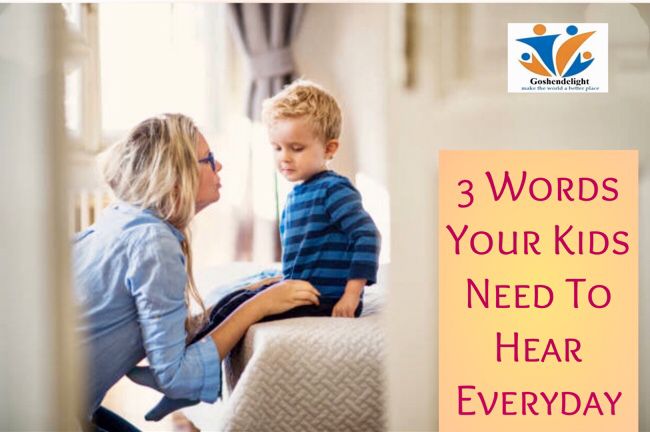The 3 Words Your Kids Need To Hear
Every day, I send my kids off to school with these 3 words your kids need to hear. And I cannot tell you what an impact it has on their days, as well as my own… because these three words work for any age.
Someone yanks the toy away from your four-year-old at preschool.
Your daughter’s on-again/off-again friend leaves her out at recess.
Everyone’s swearing on the bus while your son rides home from middle school.
A little girl who dresses differently is made the butt of all the jokes by a group of kids.
Your daughter is feeling the pressure to have a boyfriend, despite being only 12.
These are the things our kids face every day…most of them outside of our watchful eyes. With school, extracurriculars, and the general autonomy that grows with age and maturity, our kids are out of our sight sometimes more than half of their waking hours.
So what will guide them when they are not with you and face things like inequity, bullying, loneliness, and peer pressure?
Yes, on an obvious note, we should be setting a good example at home.
We should be modeling the behavior we want our kids to have – kindness, respect for others, an acceptance of differences both physical and mental.
But it’s different with adults. How often are you in a situation where adults are bullying one adult in the group and making him or her cry? Please God, tell me never.
The point is, a lot of situations our kids will encounter are not ones they will actually SEE their parents deal with.
So yes, the foundation you build at home will help them develop the ethics and moral compass that will guide them in these situations.
But as to that part about them being away from you… what can we do?
Well let’s think back about how you or I may have acted when our parents weren’t around.
I’m not saying I was bad…but I was different.
So I realize my kids are no exception. And it doesn’t make them bad either – they are doing exactly what every kid from the beginning of creation has done.
They are forging their own path – learning how to handle themselves in this brave new world.
Three Words They Need To Hear Every Single Day…
So what can we do every single day to make sure what we have spent years teaching actually stays with them as they go out the door?
Well I can tell you what I’m telling my kids… three simple words.
And no, it’s not “I love you”… (though they need to hear that, too.)
As we drive to school each morning and the girls are looking at me for one last time before they leave, I tell them…
“MAKE GOOD CHOICES”
In unsaid words, I’m telling them so many things:
- Take the love and the way I raised you and hold it tight as you leave me.
- Don’t forget who you are…what you stand for…where you come from.
- Put yourself in someone else’s shoes that’s feeling lonely, ostracized, being made fun of.
- Respond with love when someone hurts you, or at the very least, walk away.
- Don’t hesitate to tell an adult if you see something that is wrong.
- Remember that not everyone you come in contact with has parents that love them, a home that supports them, and a safe haven to return to that night.
- Keep in mind that we all are faced with the choice to either help someone or hurt someone…either by our actions or our lack thereof.
- Make the choice in every situation that will let you come home and rest easy that night.
As simple as not hitting a kid in preschool when he took your toys or as complex as walking away when all the other kids “are doing it.” Whatever “IT” may be.
Because sometimes our children need to hear our voice in their head in those moments.
Not a voice telling them they will get in trouble.
Or that we will be disappointed.
But a voice that says I love you. I trust you. You have a good heart. Make good choices.
Remember that the way we talk to our children becomes their inner voice.
Source:yourmodernfamily.com

